“Look at those dead bastards.”
On July 12th, 2007, in New Baghdad, Iraq, 12 civilians, including two Reuters journalists, were shot dead in a series of air-to-ground attacks by US military Apache helicopters.
On April 5, 2010, these very same attacks received worldwide coverage and controversy following the release of 39 minutes of classified gunsight footage by WikiLeaks. The video, which WikiLeaks titled Collateral Murder, showed the US military crew firing on a group of civilians, killing them in cold blood, and sneering, ‘Look at those dead bastards,’ as their victims lay on the street.
It was US intelligence operative turned whistleblower Chelsea Manning who provided Wikileaks with this incriminating footage along with hundreds of damning documents and files. This leak would kick-start a global controversy over the freedom of speech and our right to know when war crimes are committed by agents we are democratically responsible for.
WikiLeaks would go on to release an extraordinary compendium of over 91,000 internal military logs which came to be known as the Afghanistan War Diary and the Iraq War Logs, which revealed over 15,000 previously unreported civilian deaths, giving the public unprecedented access to the US government’s foreign activities.
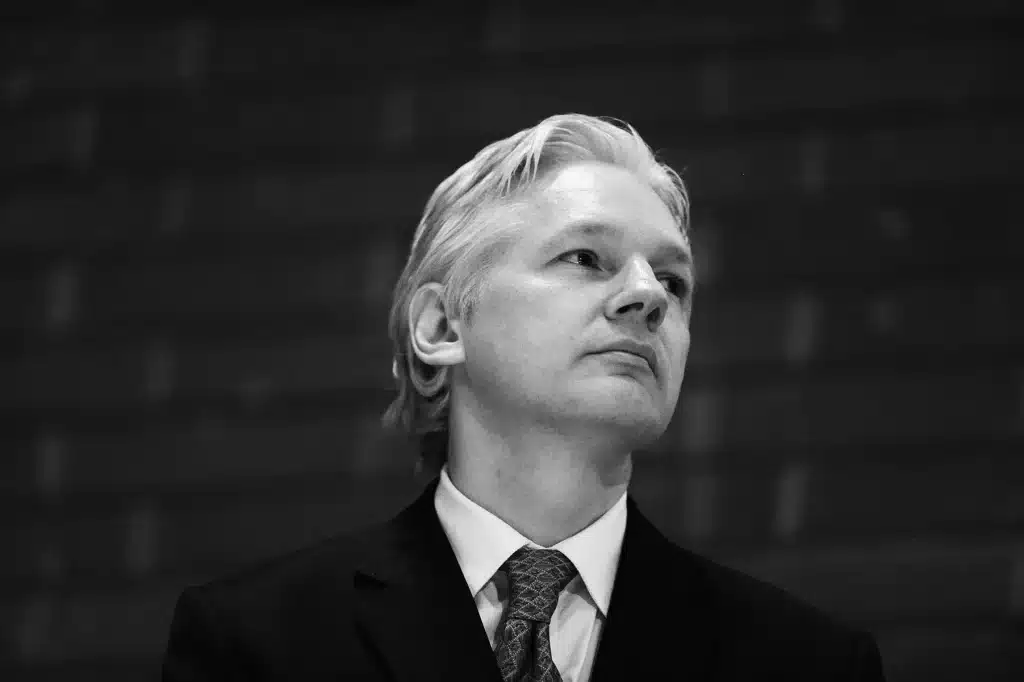
The disclosures of WikiLeaks and Assange from 2010 onwards ignited a firestorm of controversy and a relentless ongoing pursuit by the most powerful Empire on the planet. Since 2010, Julian Assange has been detained in one form or another and is currently sitting behind bars in Belmarsh prison. He is awaiting a decision from the U.K. High Court Judges as to whether he will be extradited to the US to face charges under the US Espionage Act, with the threat of a 175-year prison sentence.
Despite being detained, silenced and hidden from public view in maximum security Belmarsh Prison, multi-award-winning Australian journalist and publisher Julian Assange has become one of the loudest voices for free speech of our times.
They will chase me to the ends of the earth, and they will make my life hell, but It’s my obligation to make sure that the public sees this information.
Julian Assange
Julian Assange has risked everything to bring the truth to light and it is this which has inspired Director and Producer, Kym Straton’s documentary, ‘The Trust Fall,’ now playing at UK cinemas.
The Trust Fall examines the meaning and significance of the insights that WikiLeaks shared with the world, the resulting behaviour of the governments involved, the extraordinary personal risk taken by Assange, and the wider fundamental issues around press freedom that affect all of us and our right to know.
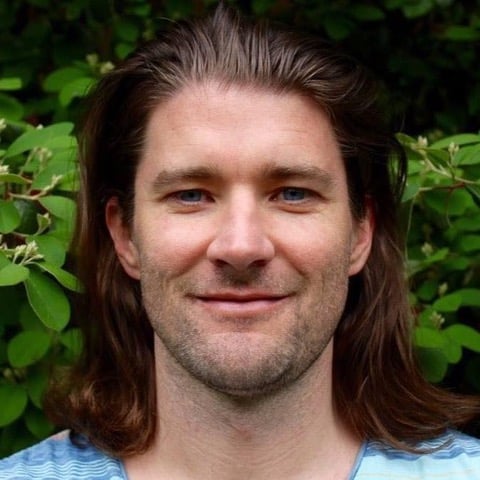
Filmed over two years on three continents and in ten cities, the film features an array of luminaries including Daniel Ellsberg, John Pilger, Tariq Ali and Chris Hedges, with the insights of experts including Jennifer Robinson, Jill Stein, Stefania Maurizi and Nils Melzer, in addition to reflections of Assange’s family including Stella Assange, John Shipton and Gabriel Shipton. It is narrated by Roger Waters, M.I.A, Tom Morello and Jonathan Oldham.
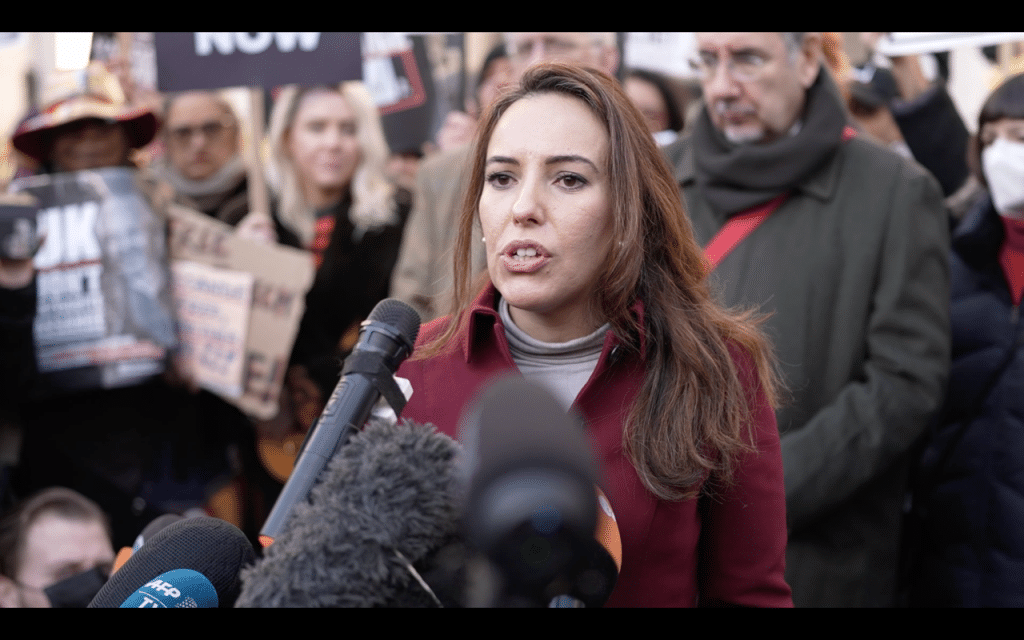
Kym Staton announced that he wanted the film to anger and shock, and hoped that people would leave the cinema exhausted, shaken and compelled to take action. Staton has achieved exactly that. Within the opening minutes of the film, we see President Joe Biden, describing Assange as a digital terrorist, and Hillary Clinton declaring that ‘He needs to pay for what he has done.’ These inflammatory statements utterly dismiss the atrocities committed by the US military and instead direct misguided aggression towards Assange and WikiLeaks.
“We are familiar with groups whose abuse we expose, attempting to criticise the messager to distract from the power of the message.”
Julian Assange
“In 2010, I witnessed the ‘Collateral Murder’ video on the nightly news,” explains Staton.” At the time I didn’t make sense of it. I had no idea of the significance of this footage, or who Julian Assange or WikiLeaks were. I gradually pieced it together over the following eight years and then was motivated to make a film about it.”
The crowd-funded film, narrated by Susan Sarandon, Roger Waters, M.I.A, Tom Morello and Jonathan Oldham, delves into the situation, treatment and wider implications of Assange, and adds weight to the campaign for the freedom of a journalist at a time when 500 journalist’s across the world find themselves behind bars because of their work.
The Trust Fall features a never-seen-before interview with Sajad Mutashar, the ten-year-old Iraqi child who was a victim of the infamous “Collateral Murder.” The interview adds a new emotive emphasis to the shocking war crime that was covered up by the US Government.
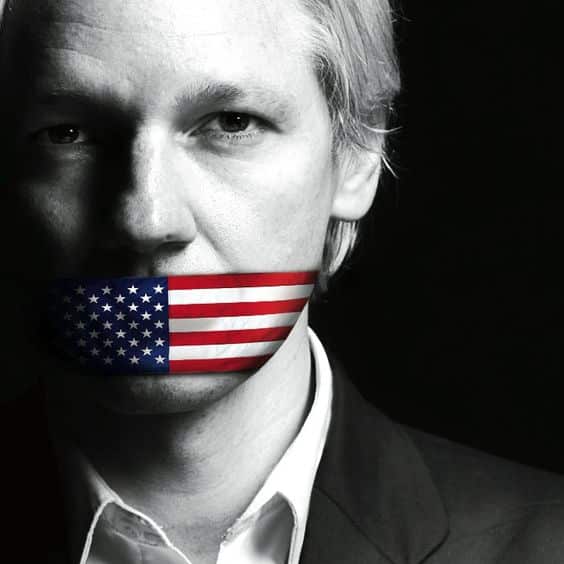
“We were fortunate to be given footage of the child victim of the Collateral Murder incident 10-year-old, Sajad Mutashar,” Staton tells us. “This combined with putting the collateral murder video up on a big screen with a highly insightful commentary and explanation from experts such as John Pilger, it all becomes something incredibly moving and impactful.”
The film has taken Staton nearly 3 years to pull together and has become part of his life. It is an important piece of work that needed to be made and casts a light on the truth of Western imperialism and demolishes the idea of a good and virtuous nation fighting tyranny and terrorists. It also reinforces the importance of our right to freedom of speech and the importance of journalistic integrity.
In watching and researching The Trust Fall, I came across a review from The Guardian, where the opening sentence read: “Remember Julian Assange? Having dominated headlines in the 2010s, the WikiLeaks founder has dropped out of sight having been confined at London’s Belmarsh prison since 2019.”
It came across as a pithy and arrogant statement. Less we forget that it was the Guardian who once upon a time benefited greatly from Assange’s work and plastered it across their front pages, before turning their back on him.
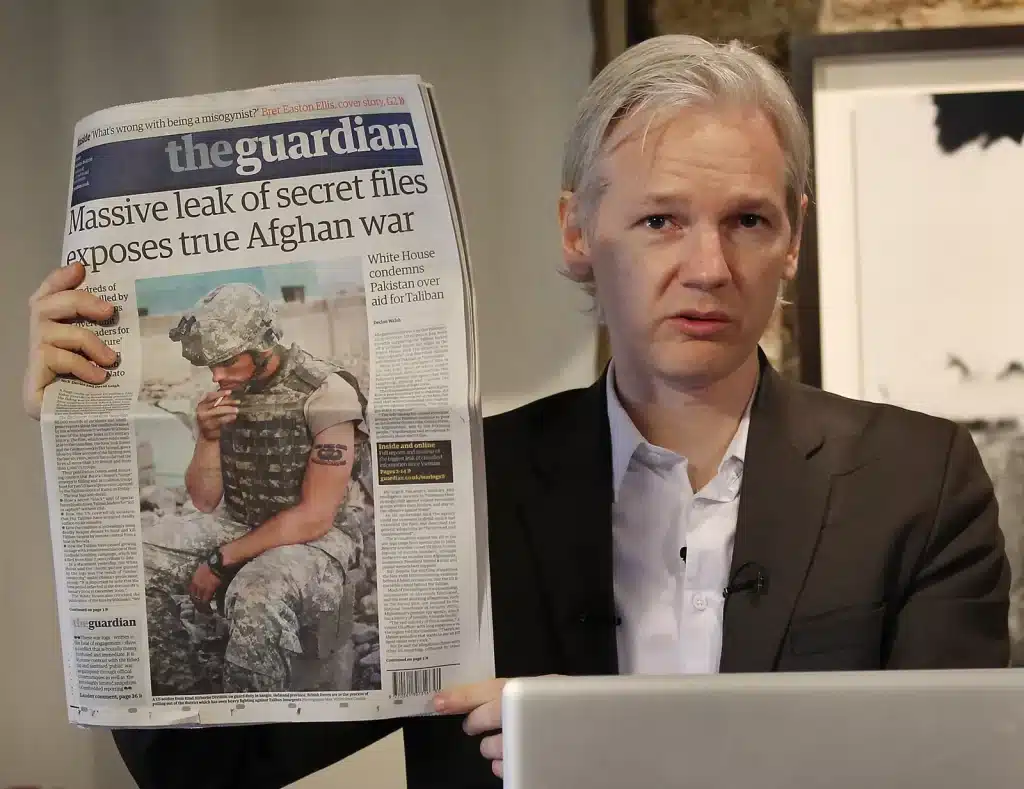
Assange’s fate could have huge repercussions for journalists and media all across the world, and I’m not sure if some people still quite understand that. Whilst it’s true that he has been out of sight, he has never been out of mind and this film is a testament to that.
“This film has taken off so fast, and it’s so huge that it is now in cinemas so quickly,” says Staton. “I’m not thinking about anything else in the future, and I’m not even thinking about having a break. I thought by this stage, things would slow down, but I’m still working 16 hours a day at the moment, so it’ll be a long time before this project has finished, and I won’t stop working until Assange is free, no matter how long that takes.
It was a pleasure for The Atlantic Dispatch to sit down with Kym Staton as we spoke about his experience of making the film, journalism, whistleblowers and why the fight for Julian Assange’s freedom is so important.
I just felt like I had to do something, whatever I could do.
I had this sense of my own uselessness on the issue that I was so slow to understand. And I felt like I had some catching up to do. When I started to really delve into it, and look at all the details of the way Julian has been treated, the injustices, the psychological torture, the solitary confinement, the defamation, the smearing, I just felt like I had to do something, whatever I could do.
I’d had 10 years, showing other people’s documentaries and thought about making one myself initially. With this, it was going to be a three-month project, making a YouTube documentary, with the title, ‘Free the Truth Free Assange.’ It was going to be a simple project without any complicated licencing and things like that, because I didn’t have the funds to do anything fancy.
It was thanks to 2000 crowd funders, that it became possible to make something and it was about six months into the project that the crowdfunding really started to build up and we realised that it could be possible to make something worthy for cinema.
THAT showed me this massive worldwide support.
In the beginning, it was just a very modest project, and when I managed to get the first interview lined up with Julian’s father, John Shipton, that was a big step and I hopped on a plane down to Melbourne and interviewed him. And I did a terrible job. I filmed it on my mobile phone, and I forgot to even put it on HD. But funnily, you know, a small clip of that is in the film, where John Shipton says, ‘All we’ve ever asked is for the United States to obey their laws.’ It’s SD footage, and it was such a good point that we just put it in any way. But anyway, at the end of that interview, out in the street, I said, ‘John, can we just take a photo?’ and he said, ‘Sure,’ so we took the photo and shared it on our Facebook and it went viral. And that sort of showed me this massive worldwide support.
The project has really stretched me in every possible way, intellectually, to sit down in front of people like Daniel Ellsberg, John Pilger, and Tariq Ali, I really had to do my homework. I’m not someone who’s ever been interested in politics, it was just a sort of surface-level interest. So I had to study up and I only had basic camera skills, filmmaking skills, and editing skills. So it was just a really big learning curve in many ways, and somehow we got through it.
It has been fraught with challenges, and it was a two-year almost three-year project with the editing. The editing alone took a whole year of sitting in front of the computer with various editors. It was 800-plus hours of editing, it was a lot more than I thought. I was just really unskilled and lacking in knowledge of the whole process, but I found people to give me a lot of advice and help.
We wanted to make something that would motivate people into action.
As far as any sort of opposition or anyone trying to undermine the project, I expected that, and I even warned our editors that we might get hacked. Nothing happened. And, for a while, I was scratching my head wondering why that was. My theory is that the US government, think that, any journalism or any documentary, will basically help them in their mission to scapegoat Assange and to warn off other journalists from exposing crimes and truth.
They make that assumption because typically a documentary is documenting something from start to finish, it’s a sequence of time. Whereas this film is different. It’s the journey not through time, but it’s a journey of understanding.
What we wanted to do with the film was to make it something that would motivate people into action. Documentaries, don’t usually do that. Usually, you watch a 90-minute documentary, and it gets to the end, and you think, ‘Oh, well, someone else will take care of that.’ I didn’t want to make that kind of film, I wanted to make something that was more epic, long and arduous. And at the end, you would feel exhausted, and you would feel motivated, you would feel like you’d had an eye-opening experience. And maybe it’s completely changed your worldview. That’s what we’re aiming for.
It’s absurd to say that Assange has put lives at risk. there is no evidence of this.
What psychopaths are well known for is their projection. So when you hear Hillary Clinton say, ‘He has to answer for what he has done.’ that’s because she’s thinking that in the back of her own mind, and that’s what they love to do. Then there is that smear that keeps perpetuating, which is that he put lives at risk, which is just so false, and it’s actually an inversion of the reality.
The reality is that the US has killed millions upon millions of civilians in wars that they’ve led, so they haven’t put lives at risk, they’ve stolen lives and completely ruined whole countries.
So it’s absurd to say that Assange has put lives at risk. And, you know, there is no evidence of this and actually the Pentagon had to admit, in the trial of Chelsea Manning, that there was no evidence that any of this had put anyone’s life at risk at all.
Journalists should be supporting him 100%. Every single journalist, if they’re brave enough to do that.
In the beginning, a lot of mainstream media, including the top newspapers turned against Assange, such as the Guardian, and journalists started to smear him. I guess they get their marching orders from up top and follow along with the sort of consensus.
As a result of that, they’ve undermined their profession, because he was bringing more quality to the journalistic profession. And so journalists should be supporting him 100%. Every single journalist, if they’re brave enough to do that.
Over the last few years, we’ve seen these big newspapers and various journalists starting to support him mildly. But it should be a massive, massive campaign from the big newspapers because they were benefiting from his material. They were putting it on their front pages, for a long time at the height of the power of WikiLeaks in 2010 and 2011.
The media and governments like to portray whistleblowers as treacherous.
A lot of people have said that If Assange is extradited, it will have a chilling effect on journalism. But I think we’re already in a journalistic Ice Age, where any journalist that gets something on their desk, whether it be a crime of a government or somebody powerful, that should be put out to the public, they’re scared to do it, because of the Assange effect, and that’s understandable.
What we need is, and it’s not so much that we need journalists to be brave, we actually need the public to support journalists and to support whistleblowers, to look at whistleblowers as courageous heroes with a lot of moral integrity. The media and the governments would like to portray whistleblowers as somehow treacherous, or, as traitors.
That’s what they would like the public to see whistleblowers as, but we should see them as brave courageous people who have tried to bring the truth to the world, and it should be an important part of the structure of our modern, so-called democratic society.
I can’t believe the state of the world and what’s going on in places like Ukraine and Gaza.
We really have to win this battle to get Assange free, because otherwise, everything’s going to go downhill if he gets extradited, and if he’s convicted. If he doesn’t survive all of this, then it’s hugely detrimental to our ability to have truth in journalism.
Before this, I worked on other causes, single-use plastic, animal rights, and raising awareness of the plight of Indigenous Australians, and I’ve been able to do this work through Films for Change. And, you know, it motivates me, it gets me out of bed in the morning to try and make a difference in the world
I look around and I just can’t believe the state of the world and what’s going on in places like Ukraine and Gaza and the poverty in other parts of the world, and just the general corruption and inequality, I can’t just turn a blind eye to all of that.
FREEDOM OF JULIAN ASSANGE
The theory with the court hearing is that they will allow the appeal, they’ll drag it out because more than half of American citizens now probably support Julian’s freedom. So, it doesn’t look good for Biden, if the trial begins, and there is all this criticism, it’ll be annoying for him in his battle to continue as the President of the United States, so they’re probably going to allow the appeal.
I can then see it dragging on for six months, but my hope is that the film will be seen by so many people and that there’ll be a big awakening to this issue. The public pressure will grow and grow and the government’s will, especially the Australian Prime Minister, have to take a brave stance and call outright for the freedom of Julian Assange.
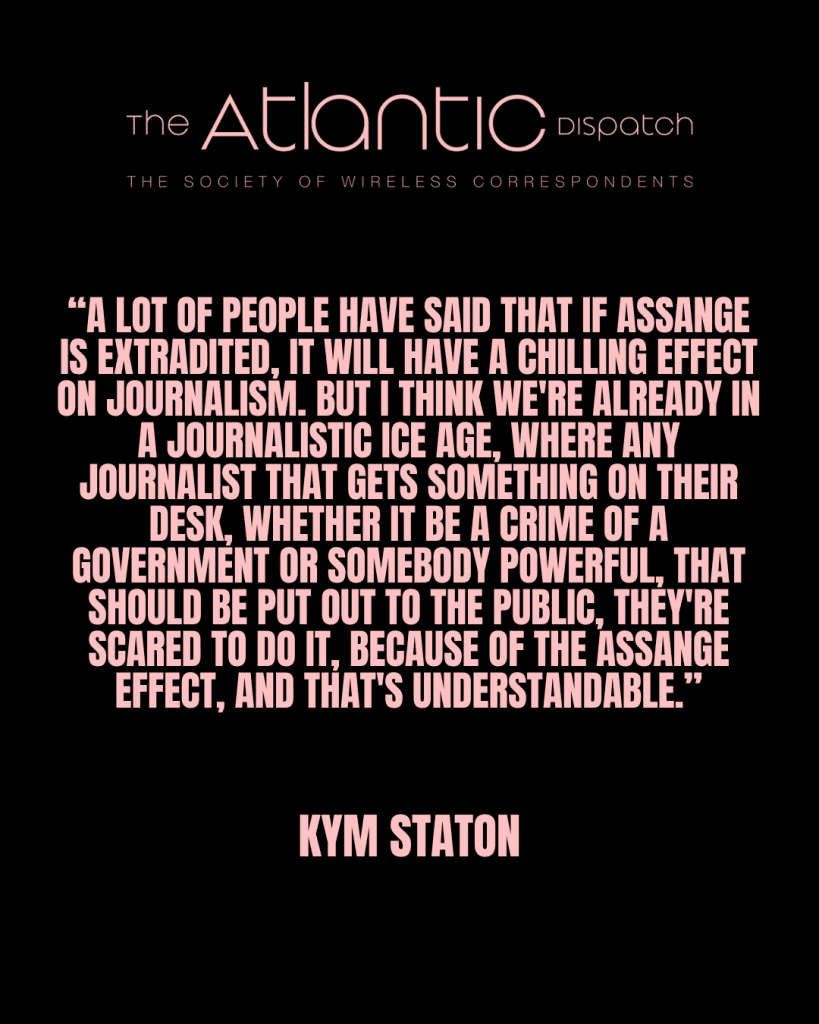
All our thanks to Director and Producer Kym Staton
THE TRUST FALL: JULIAN ASSANGE is in UK cinemas on 15th March www.thetrustfall.org
Instagram – @thetrustfalldoc https://www.instagram.com/thetrustfalldoc/
Facebook – @thetrustfall.doc https://www.facebook.com/thetrustfalldoc
Twitter – @thetrustfalldoc https://twitter.com/thetrustfalldoc
